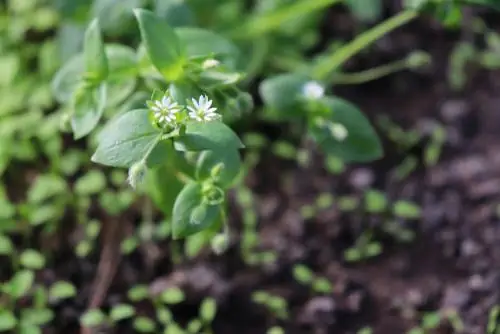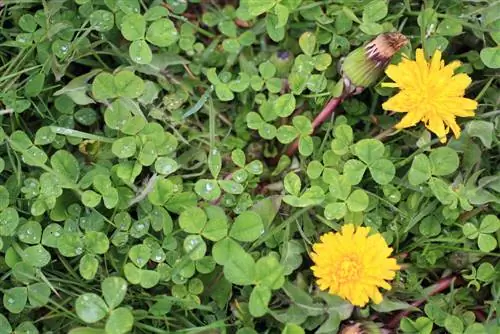- Author admin leonars@hobbygardeners.com.
- Public 2024-01-05 20:48.
- Last modified 2025-01-23 11:22.
There is hardly a garden where clover doesn't grow. While one garden owner is happy about it and lets it grow, the other desperately tries to banish it from his kingdom. You can read why both are right here.

What types of clover are there in the garden and how do you care for them?
Various types of clover such as common horn trefoil, horn sorrel, red clover and white clover can grow in the garden. Clover can serve as a weed, crop, forage or soil amendment. Proper care includes appropriate location and occasional watering.
What types of clover grow in the garden?
These four types of clover grow particularly often in the garden:
- Common horn trefoil (bot. Lotus corniculatus)
- Horn sorrel (bot. Oxalis corniculata), also called horned sorrel
- Red or meadow clover (bot. Trifolium pratense)
- White clover (bot. Trifolium repens)
As can be seen from the botanical names, these are plants of different genera. Accordingly, they have to be cared for differently or removed from the garden.
Is clover a useful plant or a “weed”?
Both and - clover is commonly considered aweed, but is also used as aforage plantor forsoil improvementused. It enriches the soil with valuable nitrogen. If you have rabbits in your house or garden, you can feed individual plants to them. Once clover has spread in your garden, it is often difficult to remove.
Does it make sense to plant clover in the garden?
In some situations it isquite sensibleto sow or plant clover. Wood sorrel is ideal as a ground cover for shady places, for example under trees and bushes. White clover likes to grow in rather wet locations. Red clover, on the other hand, prefers the sun, but also thrives in partial shade. All types of clover serve as a food source for insects such as bees, bumblebees and butterflies. Maybe you want to plant clover instead of lawn on a larger area in order to contribute to environmental protection.
How do I properly care for my clover?
Clover is basically veryeasy to care for. All species like to spread on their own, so they don't need to be constantly replanted or resown. If the location is well chosen, you can usually even avoid watering.
How do I remove clover from my lawn?
Since clover sometimes has very long taproots (up to 70 cm depending on the variety), it is usually difficult to remove from the lawnIf you use weed killer (109, 00 € on Amazon), then you should use special lawn herbicides that do not attack the grass. It is therefore better to cut out the clover. The sooner you start, the less work you will have. So don't wait until the whole lawn is overgrown with clover. Scarifying the lawn is also effective against clover.
Tip
Special case of lucky clover
The lucky clover that is often bought and given as a gift on New Year's Eve has nothing to do with the clover that is native here. Although it is a perennial plant, it is not hardy. In summer the lucky clover feels very comfortable in the garden, but it prefers to spend the winter frost-free. It is ideal as a potted plant for the terrace or balcony.






